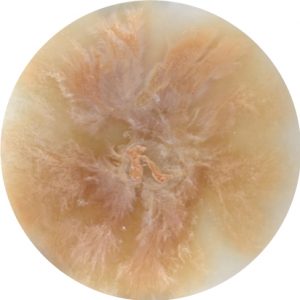After nearly 50 years of cancer research in the U.S., the search for a cure continues at the University of Mississippi.
The University of Mississippi School of Pharmacy received a research grant from the National Cancer Institute this week for the cancer prevention research work done by the university’s Cole Stevens and Kristie Willett, both of whom are professors in the School of Pharmacy.

Archangium violaceum. Photo courtesy: Cole Stevens
The research grant will be used to finance research into the bacterial production of an acid with the potential to act as an anticancer treatment. Essentially, this type of bacteria has anti-cancer properties but does not naturally grow fast enough to be produced in large enough quantities to test the enzymes on human cancer cells. Stevens’ research aims to solve this problem.
“The molecule is already shown to have really different, interesting anticancer activity, but there’s very little of the bacteria out there,” Stevens explained. “Our lab is taking the DNA material that’s responsible for making all the enzymes that build the molecule inside the organism and package those up onto a plasmid and then introduce that into a different bacteria that grows faster.”
With more access to the anticancer molecule, Stevens will be able to observe the viability of its potential anticancer capabilities.
Stevens’s work will represent the first half of the research, with the remainder falling into the hands of Willett and a population of zebrafish carrying a strain of human breast cancer cells.
“Our lab has crossed two zebrafish lines so we can image breast cancer cell migration,” Willet says of her role in this research. “We will test his compounds in this model for their ability to inhibit cancer cell growth and metastasis (in the fish).”
Willett is chair of the Department of BioMolecular Sciences and a professor of pharmacology and environmental toxicology. She has managed the University of Mississippi Aquatic Animal Facility for the past 19 years.
Stevens has been with the university for 2 1/2 years and is an assistant professor of pharmacognosy. Educated first at Northwestern State where he received his undergraduate degree, Stevens then began his Ph.D. at Syracuse and eventually finished his doctoral research at the University of Ottawa in Ontario, Canada.
Throughout his transitions across schools and countries, Stevens continued working with the bacteria for which he eventually received his grant, and continuation of his research was a key factor when deciding to take on his current position.

“The University of Mississippi, specifically the School of Pharmacy, offers really nice environments for research and really wonderful startup packets to help you secure funding like this,” Stevens said of the research activity at Ole Miss. “The level of support here was a huge pull in bringing me to Ole Miss.”
Designated as an R1 research institute in 2015 by the Carnegie Classification of Institutions of Higher Education, Ole Miss falls within the top 2.7 percent of all universities in terms of research activities.
This designation allows the university to attract top-level scholars to positions as professors, improving the quality of education available to students, as professors are given freedom and funding to explore their academic interests.






